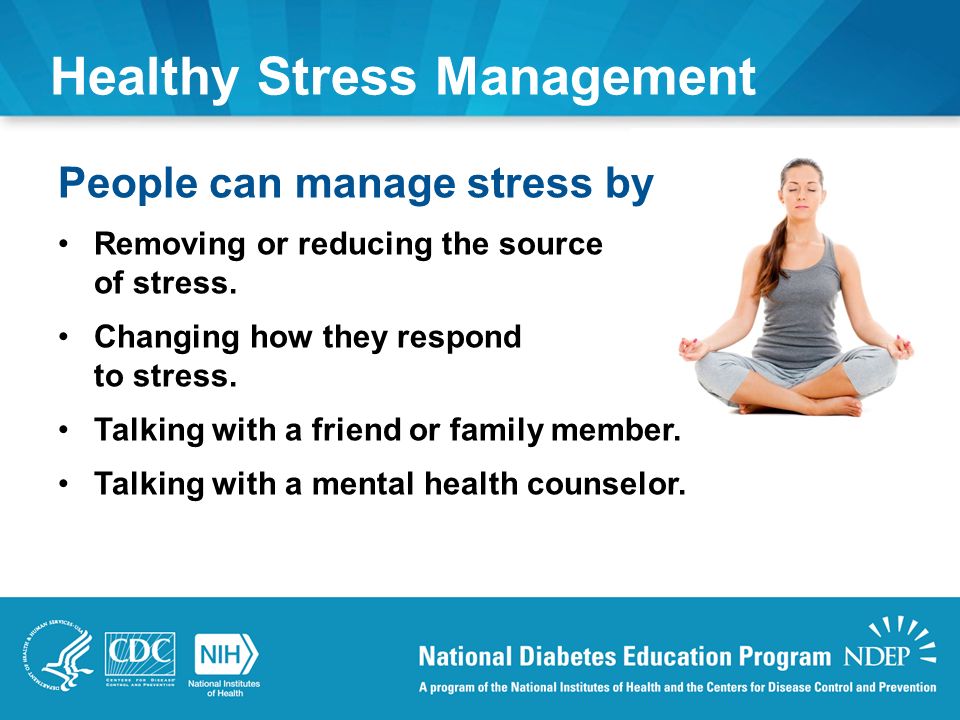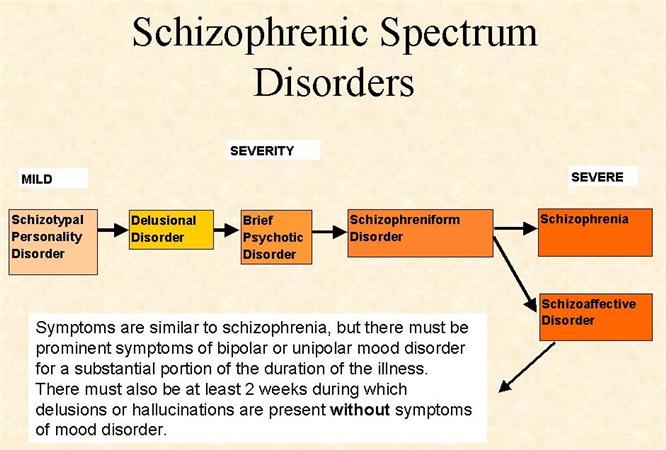Stress management techniques for students in high school
School Stress Management for Students of All Ages
School stress impacts students of all ages and backgrounds. Stress for young people “can come from a variety of sources including doing well in school, making and sustaining friendships, or managing perceived expectations from their parents, teachers, or coaches,” according to the American Psychological Association. If left unacknowledged and unassessed, school stress can lead to conditions such as headaches, muscle tension, anxiety, and depression, according to the Mayo Clinic. In some cases, the effects of stress can be more harmful to students than what caused the stress in the first place.No one can eliminate all of the external factors that can cause a student to feel stress. What students can do, however, is to manage how they respond to school stress.
Managing School Stress in Kindergarten Through Eighth Grade
Teachers have been witnessing heightened levels of anxiety in students, according to Education Dive. Stress can impact academic performance, attendance and behavior. This guide outlines ways to help K-8 students cope.
Study Planners and Organizational Guides
Having organizational tools in place, such as a study planner that notes when certain assignments are due and when tests or other exams will be coming up, can be beneficial to students who may be experiencing stress from impending deadlines or an overload of assignments. A notebook with segmented folders and dividers that helps organize schoolwork can benefit students who may be stressed because they don’t feel in control of their work.
Tutoring and Academic Strategies
Academic setbacks can cause stress levels to rise. While some students can move on from a downturn, others “remain fixated on the setback and have difficulty moving forward,” Edutopia notes. An effective way to handle this type of academic stress is to seek help. Tutoring can be an effective method of helping students cope with any academic difficulties they may be facing.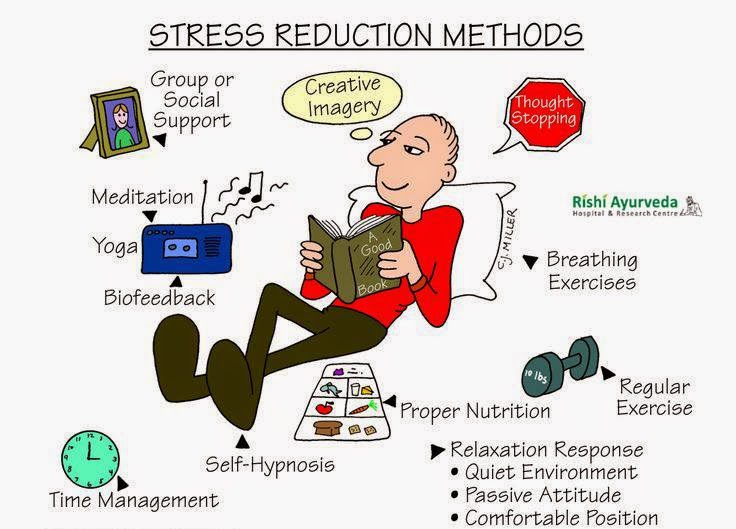 Reading has been shown to be beneficial in tackling stress, even if it’s not related to a school subject. Citing a study from the University of Sussex, an article from C2 Education notes how six minutes of reading can be effective in reducing two-thirds of a person’s stress levels.
Reading has been shown to be beneficial in tackling stress, even if it’s not related to a school subject. Citing a study from the University of Sussex, an article from C2 Education notes how six minutes of reading can be effective in reducing two-thirds of a person’s stress levels.
Staying Active and Exercising
Exercise can reduce stress by raising the body’s endorphin levels, clearing the mind, and improving one’s mood, according to the Mayo Clinic. Students can use exercise as a means of addressing and mitigating their own stress levels. The Mayo Clinic provides tips on how to develop an exercise program that can be beneficial to K-8 students. These tips include:
- Establish specific goals
- Work out with a friend
- Change one’s routine
- Exercise in increments
The specific goal for students could be to reduce stress or something more long term, such as losing weight. They could work out with another peer or classmate under parental supervision and find new ways to keep themselves physically active, all while reducing stress.
Speaking Openly About Unique Student Concerns
Some students may face bullying at school or interpersonal issues at home. Individual students may encounter unique challenges and circumstances that defy easy resolution.In these situations, according to a Psych Central article, finding a trusted professional to speak with can help alleviate stress. Speaking to trusted professionals who oversee environments in which stressors are occurring, such as a teacher, school administrator or counselor, can prove to be particularly helpful.
Addressing School Stress for High Schoolers
Commonly reported sources of stress among teens include school, getting into a good college, making life plans for after high school, and financially supporting their families, according to PsyCom. This guide outlines methods that can help high schoolers cope.
Relaxation and Meditation
Several relaxation techniques can benefit high schoolers. These include:
- Focus on breathing — taking long and slow deep breaths while disengaging one’s mind
- Body scan — concentrating on different body parts while releasing tension and relaxing
- Mindfulness meditation — sitting in a comfortable position and paying attention to the present moment
Exercise, Yoga and Physical Activities
Similar to K-8 students, high school students can enjoy the stress-relieving benefits of exercise and physical activities. For high schoolers, that could be establishing a regular exercise routine, such as daily jogs or walks, working out in a gym or joining a team sport. Yoga, too, can be beneficial to high schoolers in reducing stress. The Mayo Clinic recommends finding a qualified instructor and choosing a class at an appropriate experience level.
For high schoolers, that could be establishing a regular exercise routine, such as daily jogs or walks, working out in a gym or joining a team sport. Yoga, too, can be beneficial to high schoolers in reducing stress. The Mayo Clinic recommends finding a qualified instructor and choosing a class at an appropriate experience level.
Support and Study Groups
Study groups can be an effective means of reducing stress in teenagers, considering how academic pressures are one of the primary stressors of this population. These groups can help teens discover new solutions to academic problems and overcome difficulties they may be facing in school.Support groups can also be beneficial to teens in dealing with stress and anxiety. Psychology Today provides a comprehensive directory of available support groups for teens, depending on where they are located. For example, in Los Angeles, 14-to-19-year-olds can participate in any of a large number of helpful support groups. Teen Line also offers a directory of support groups for teens facing various issues.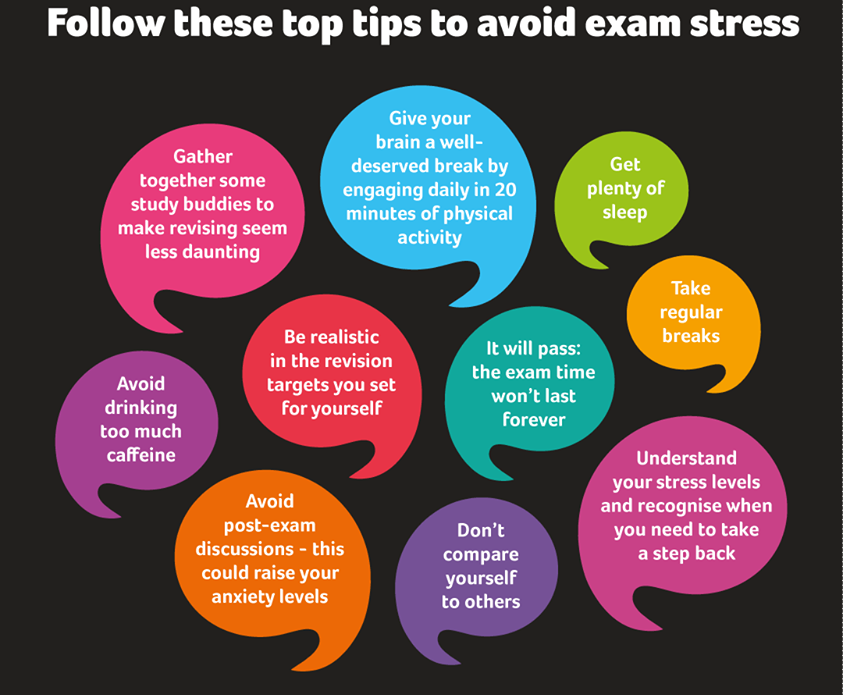
Scheduling Tips and Tools
ADDitude magazine offers time management tips for teens who have attention deficit hyperactivity disorder (ADHD) that could be helpful to any teens who may be facing stress. These include effectively prioritizing important tasks, selecting needs over wants and estimating how long it will take to complete given tasks. The website Understood suggests additional tools to help teens stay organized, such as a multicompartment backpack and a watch or timer. Color-coding belongings also is recommended.KidsHealth offers ways that parents can help teens succeed in school. Some of these tips are related to scheduling, such as supporting and establishing firm homework expectations and ensuring that teens have time to get a healthy amount of sleep. Creating a calendar and having prioritized lists for certain tasks can help teens avoid and mitigate academic stress.
Hotlines, online communities and additional resources
Oregon YouthLine is a teen-to-teen hotline that can be beneficial to those facing school stress and related pressures.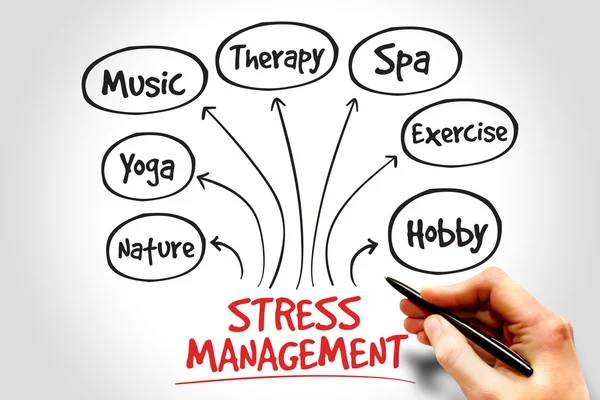 To get help, teens just need to call 877.968.8491, text “teen2teen” to 839863, email [email protected] or chat online at the organization’s website. PBS also provides a directory of different hotlines and mental health organizations for teens. These include:
To get help, teens just need to call 877.968.8491, text “teen2teen” to 839863, email [email protected] or chat online at the organization’s website. PBS also provides a directory of different hotlines and mental health organizations for teens. These include:
- National Safe Place, an organization that helps teens in crisis: 1-888-290-7233
- The Trevor Project, a hotline that helps LGBTQ+ youth: 866-4-U-TREVOR
- National Suicide Prevention Lifeline: 1-800-273-TALK (8255)
Dangers of Drugs, Alcohol and Other Harmful Coping Mechanisms
The Substance Abuse and Mental Health Services Administration offers a national helpline that is also available to teens. Their number is 1-800-662-HELP (4357). The Partnership for Drug-Free Kids has a parent’s helpline that provides helpful informational services and guidance to parents concerned with their teens’ potential or current drug use. Their number is 1-855-378-4373. They can also be reached via text at 55753.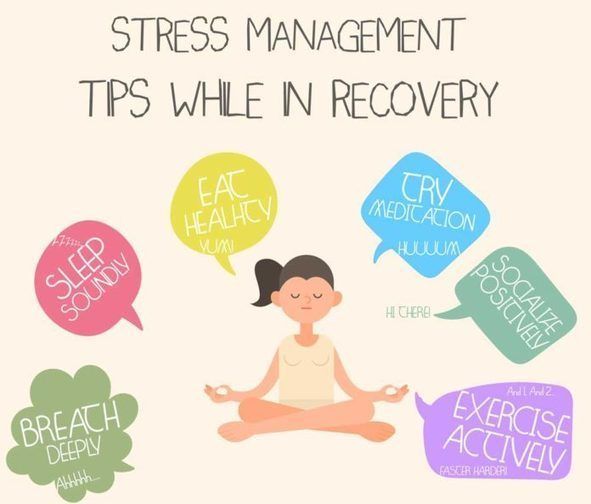 The National Institute on Drug Abuse for Teens also provides helpful blog posts, videos and infographics that can benefit teenagers who may be facing stress as a result of substance abuse.
The National Institute on Drug Abuse for Teens also provides helpful blog posts, videos and infographics that can benefit teenagers who may be facing stress as a result of substance abuse.
Handling School Stress as a College Student
One of the recurring pressures that teens experience stress over is applying to and choosing a college. When those students arrive on those college campuses, they still can face stress and academic/social pressures. This guide outlines resources that can help.
On-Campus Support Groups, Services and Mental Health Resources
Colleges and universities often offer on-campus counseling and mental health services to students. The National Alliance on Mental Illness also offers groups on different college campuses across the United States that can help students who are facing stress and mental health issues. In a 2019 publication, the National Association of Student Personnel Administrators (NASPA) published new strategies for addressing mental health support on campuses that can serve as effective guidelines for helping students face school stress.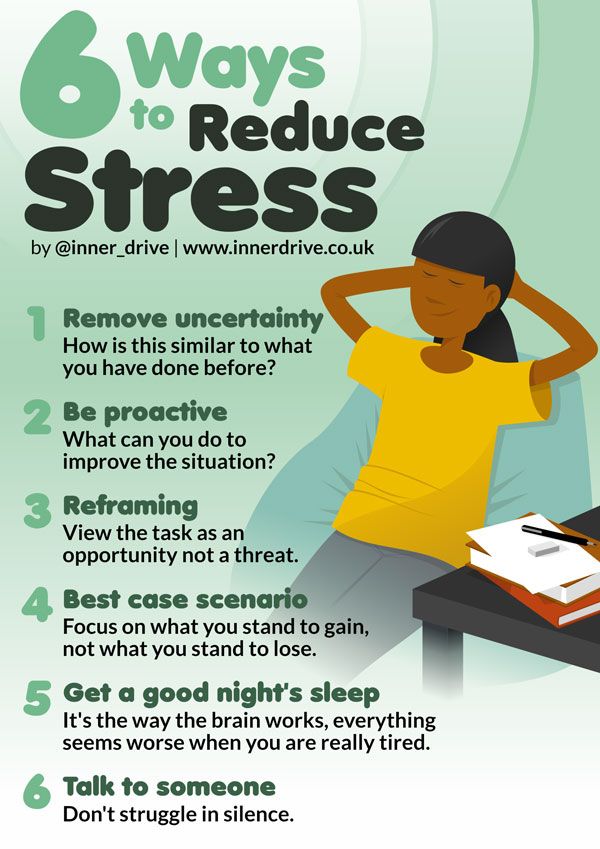
Online Support Groups, Hotlines and Other Digital Resources
The Anxiety and Depression Association of America offers an online support group where college students can share their experiences with stress and other mental health concerns.
ULifeline also provides a hotline and resources for college students facing stress and other mental health issues. To access these resources, students can text “START” to 741-741 or call 1-800-273-TALK. Depending on where students attend school, there may be additional digital resources available to them for tackling school stress through their college.
Calmness, Meditation and Other Mental Health Approaches
Britannica Digital Learning overviews several calming and breathing exercises that can benefit college students and help them alleviate stress. These include centering breath and “not mine” meditations, as well as an activity called “grounding with the senses.”
Verywell Mind also describes how progressive relaxation techniques, self-hypnosis and positive thinking and affirmations can help to improve one’s mental health and reduce stress.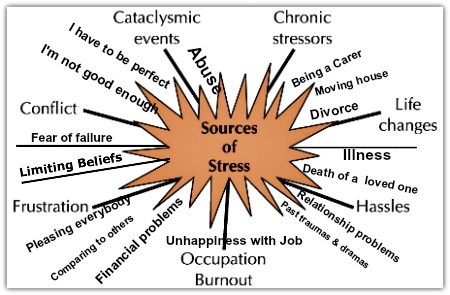
Yoga, Exercise and Additional Physical Health Strategies
Yoga Journal provides an extensive list of articles that can help college students use the practice of yoga to reduce stress and increase mindfulness. An article from Harvard Health Publishing dives deep into how various types of exercises, from participating in sports teams to vigorous workouts, help to bring enhanced peace of mind to a person. The article encourages college students to embrace exercise, in whatever form they choose, as a means of reducing stress.
Managing Pandemic-Related School Stress
The onset of the COVID-19 pandemic in 2020 transformed the educational landscape. Students have had to grapple not only with stress related to the pandemic itself but also with new challenges that have arisen from transitioning to remote education.
For students and educators who are facing stress or mental challenges amid the COVID-19 pandemic, the following resources and organizations may prove beneficial:
- Local mental health resources: The American Psychological Association provides a directory of helpful tips and resources for COVID-19-related mental health concerns.

- Institute for Disaster Mental Health: This organization provides tools and strategies for coping with stress, anxiety, and mental health concerns related to the pandemic. Some tips include focusing on what one can change, choosing news sources carefully, and managing anxiety by breaking problems down into manageable chunks.
- Leadership guidelines and suggestions: For those who hold leadership positions, such as educators and administrators, the American Psychological Association provides helpful tips for guiding individuals through this time of stress and uncertainty.
- Social media guidance: An article by the American Psychological Association notes how prolonged social media usage and exposure can create more anxiety than traditional forms of media. Understanding and mitigating the effects of social media can help students through this difficult time.
How to Manage Stress in School at Every Grade Level
- Learning Environment
- Articles
byChristopher E. Nelson
Nelson
Whether it’s test day, a major assignment is due, the Internet is down, or things just aren’t going as planned, school-related stress can affect students of all ages. Fortunately, there are unique opportunities for Learning Coaches and students in online school to identify the symptoms of stress and learn how to manage stress in school.
Download our Stress Management Tips
What Causes Stress in School Students?
The Mayo Clinic reassures parents that experiencing stress, while unpleasant, is a normal reaction to all types of challenging situations. Anything from a new routine, test anticipation, challenging assignments, social pressures, a busy schedule, arguments with siblings, or even just being tired can trigger stress in school students. Students can even stress over positive events, like accepting an achievement award or going on vacation.
Some students experience stress as a motivating factor, while for others, it can severely disrupt the school day.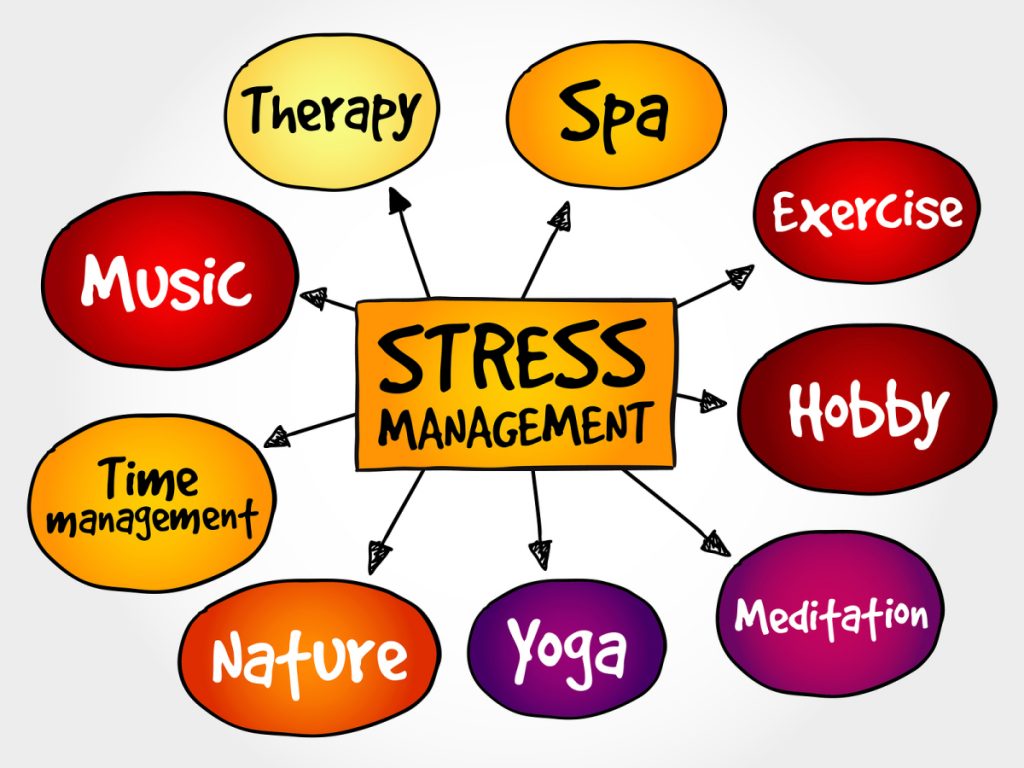 Prolonged stress can adversely impact health and academic performance.
Prolonged stress can adversely impact health and academic performance.
Symptoms of Stress in School Students
The first thing to know about how to manage stress in school is how to identify the signs and symptoms of stress. Stress manifests differently from person to person. According to KidsHealth®, these are a few of the more common symptoms of stress in children:
- Mood swings
- Acting out
- Headaches
- Stomachaches
- Difficulty concentrating
- Developing self-soothing habits
- Becoming withdrawn
- Difficulty sleeping or nightmares
- A sudden change in academic performance
Learning how to manage stress in school helps students become resilient adults. Here are our favorite tips for how to get less stressed in school. Although meant to reduce stress for students in elementary, middle, and high school, these techniques can help students, and even adults, of all ages.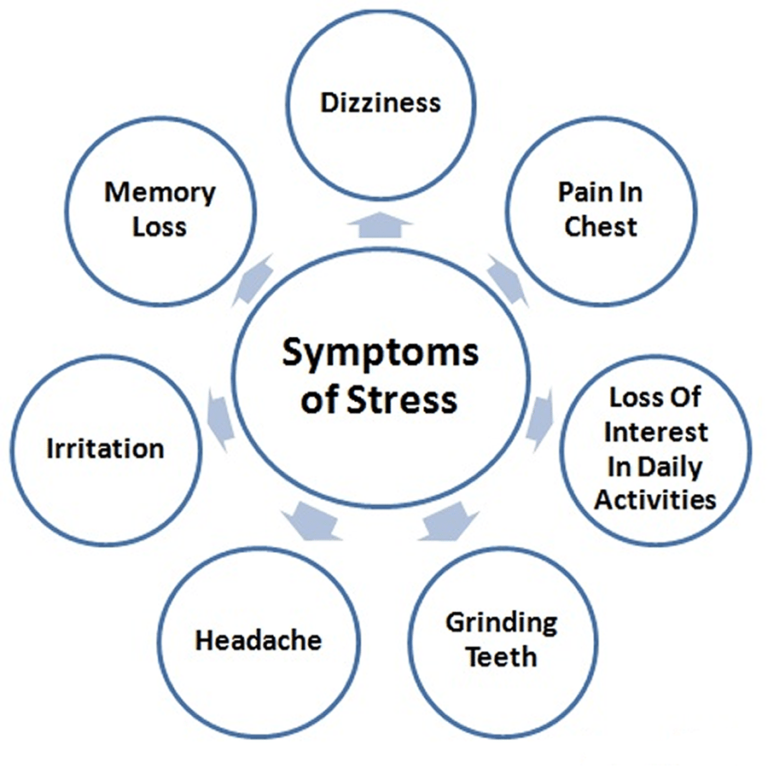
How to Manage Stress in Elementary School Students
Younger elementary school students are mostly getting used to the routine of the school day. But in later elementary grades, the responsibilities required of schoolwork and thoughts of disappointing parents or teachers can be stressful. Teaching students at this age how to manage stress in school can help them adjust to online, virtual, or traditional schooling without getting overwhelmed.
Listen to calming music when it’s time to focus.
Music can help young learners get used to moving from one task to another. Music can also help students study. Try getting ready for the school day with upbeat music and switching to instrumental or downtempo music when working on individual assignments that require focus.
Plan breaks to do things that aren’t school-related.
It’s unrealistic to expect a first- or second-grader to sit still through a full day of live virtual lessons. That’s why it’s important to schedule snack breaks, playtime, game time, or other activities that are not learning-focused throughout the day. Stress-management games for students can be as simple as taking a break to play a card or board game before beginning the next lesson. Set time limits for breaks so that students know when it’s time to move on to the next task.
That’s why it’s important to schedule snack breaks, playtime, game time, or other activities that are not learning-focused throughout the day. Stress-management games for students can be as simple as taking a break to play a card or board game before beginning the next lesson. Set time limits for breaks so that students know when it’s time to move on to the next task.
Relax and learn mindfulness through sensory experiences.
One of the best ways to reduce stress for students is through mindful activities that activate the senses, taking the focus away from whatever is causing stress at the moment. Sensory activities for children include playing with modeling clay or Play-Doh, playing in a sandbox, going on a nature walk, painting, making lunch together, sorting objects or toys, or even playing a musical instrument. Weighted blankets, wobble stools, and headphones can also be a part of a calming sensory classroom for young children to increase focus and reduce stress.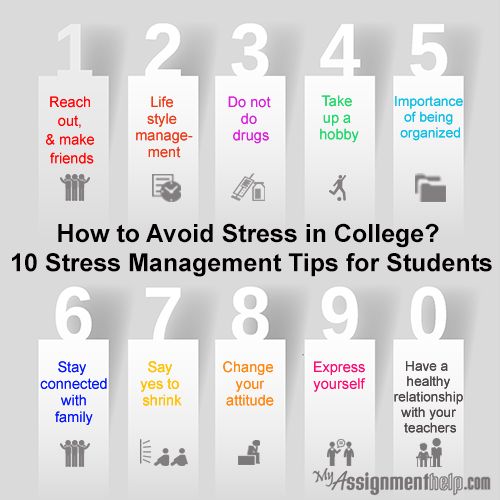
How to Manage Stress in Middle School Students
As students advance to middle school, they begin to take on more challenging classes. Middle school students may also experience social pressure in school, so planning activities designed to reduce stress for students this age can be extremely important.
Exercise during the school day to release endorphins.
Most, but not all, U.S. middle schools still offer physical education (PE) programs to help children meet recommended levels of physical activity. Some students at Connections Academy play organized sports or engage in serious athletic training as a part of their daily schedule. Exercise doesn’t have to be extremely structured to make a difference. A simple activity, like taking a walk or bike ride around the neighborhood, can help students blow off steam before their next class.
Practice asking teachers and other adults for help.
Students sometimes have a hard time speaking up in class, particularly at middle school age.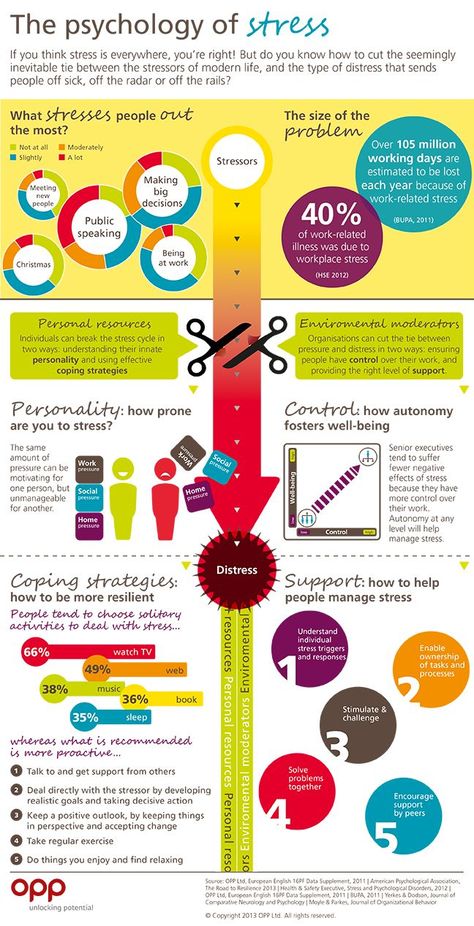 Students can overcome the challenges of speaking out and build their support networks at school by learning to ask for help. Online students have access to their Learning Coach, teachers, and school counselors at Connections Academy when they have a question or need extra help.
Students can overcome the challenges of speaking out and build their support networks at school by learning to ask for help. Online students have access to their Learning Coach, teachers, and school counselors at Connections Academy when they have a question or need extra help.
You can help a shy child by rehearsing sample situations or helping them create some scripted things to say. Talk to your child’s teachers about what you’ll be doing to help your child, so you’ll be on the same page. Asking for help gives students a new perspective, lets them know they are not alone, and encourages them to keep looking for solutions when things get tough.
Relax before bedtime and get plenty of sleep.
Ensuring that your child is getting enough sleep often goes a long way toward managing stress in school. Kids 6–13 years old should get 9–11 hours of sleep each night and teens need 8–10 hours. To ensure a restful night of sleep, students should take time to wind down before going to bed. Limiting use of technology and exposure to blue light i.e., screens—right before bed and talking out any current worries are two steps toward better sleep.
Limiting use of technology and exposure to blue light i.e., screens—right before bed and talking out any current worries are two steps toward better sleep.
How to Manage Stress in High School Students
High school students enjoy an increased level of independence, but they are also preparing for graduation, and beyond that, college, service, or the workforce. Add the social life and peer pressure that accompany the teenage years, and you have the main causes of stress in high school. In addition to continuing the stress management techniques above, especially getting enough exercise and sleep, building resilience is a big part of how to manage stress in high school students.
Break large assignments into smaller, more manageable tasks.
One of the most important skills a high school student can learn that will help to reduce stress is time management. Students should create a schedule that prioritizes their assignments, live virtual classes, extracurriculars, and other tasks to ensure they can get everything done in a timely manner.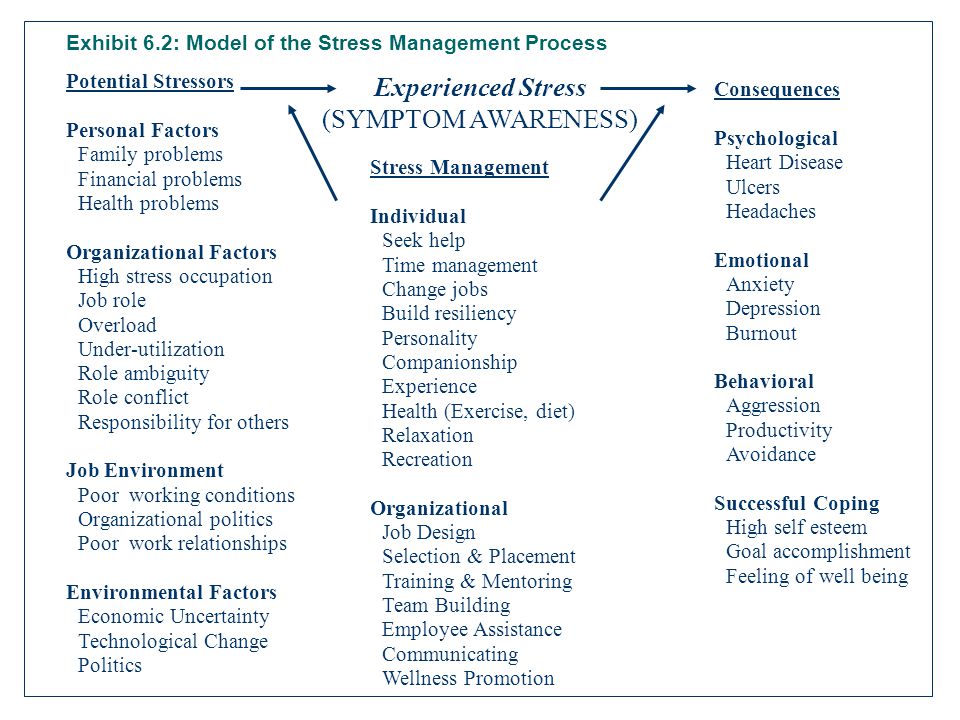 Daily planning can become part of a morning routine, or those who like to get a head start might schedule time at the beginning of each week. Having a plan can keep students from finding themselves overwhelmed by multitasking. For larger projects, setting mini goals for completing parts of the overall assignment can help reduce stress and guard against procrastination. Want to give it a try? Check out these five sample online school schedules.
Daily planning can become part of a morning routine, or those who like to get a head start might schedule time at the beginning of each week. Having a plan can keep students from finding themselves overwhelmed by multitasking. For larger projects, setting mini goals for completing parts of the overall assignment can help reduce stress and guard against procrastination. Want to give it a try? Check out these five sample online school schedules.
Use checklists and celebrate the day’s accomplishments.
Checking off a task on a list is a simple yet incredibly effective positive reinforcement. And everything is less stressful when you feel like things are going well. Daily checklists and journaling can reassure students when stress starts to creep in. Reflecting on accomplishments at the end of the day can motivate students to get back at it tomorrow. Using these stress-management tools will remind students what is within their control so they can chip away at their to-do lists instead of worrying.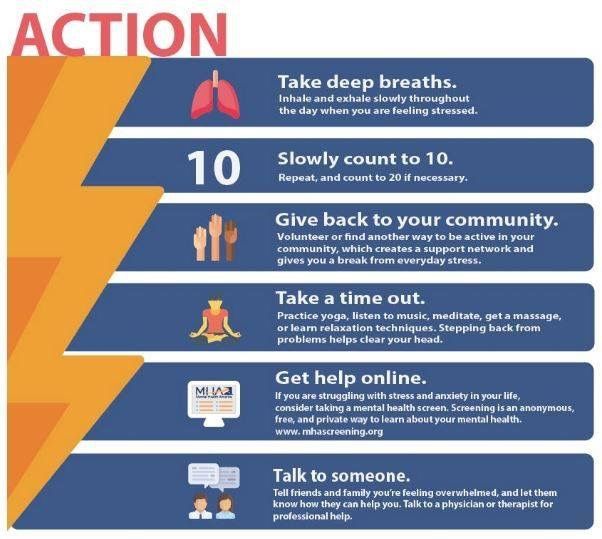
Be a part of the community.
A high school student who feels like they are part of something bigger than themselves will have less inclination to look inward and stress. Teens feel like they are not alone and have a role to play when they are connected to a diverse group of friends and reach beyond their social groups by volunteering, coaching / mentoring younger students, or working a part-time job. Being involved in the community around them gives high school students more incentive to overcome setbacks and to remain optimistic that they ultimately control their academic careers.
Getting started with these activities is an easy way to begin to reduce stress for students of all ages. And Connections Academy is here to help. Our online Resource Hub is all about helping you create a stimulating learning environment and community that fosters achievement, growth, and resiliency for your online student.
psychologist's advice / City news / Moscow website
Social sphere
Photo: Press service of the Department of Labor and Social Protection of the Population of Moscow
Stress management techniques: advice from a psychologist 9000 situation, it is necessary to be able to manage emotions, otherwise emotions will begin to control us. At a webinar held by the Institute of Additional Professional Education for Social Workers, psychologist Yana Leykina recommends several effective techniques that help to adapt to emotional overload and keep feelings under control.
At a webinar held by the Institute of Additional Professional Education for Social Workers, psychologist Yana Leykina recommends several effective techniques that help to adapt to emotional overload and keep feelings under control.
"THE MAN IN THE RAIN"
This exercise will help you make a personal diagnosis and see how you respond to stress.
Draw a human. Skill level doesn't matter, draw as best you can. Next, draw a man in the rain. Now compare them.
What should I pay attention to?
— How the little man changed in the rain.
The rain is a metaphor for stress, and the picture is a metaphor for your response to stress. If the man in the rain is larger and better drawn, this means that you are mobilized during times of stress. If it’s the other way around, then your tactic is to hide from problems. Think about it.
- How rain is depicted.
It can be torrential, weak, with thunder and lightning, etc.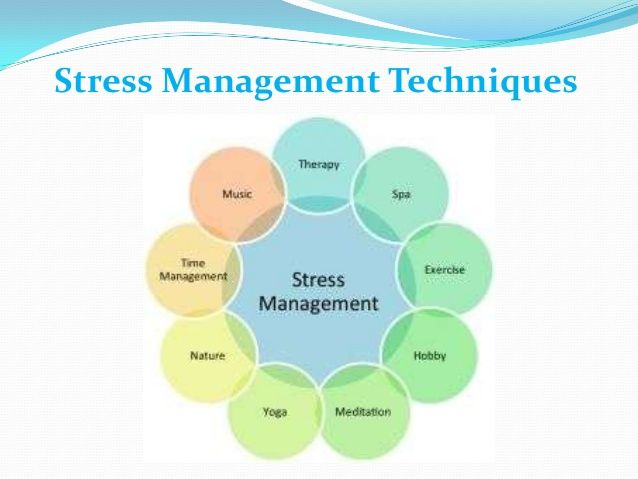 This is a reflection of your perception of reality. Light rain: You see a problem but don't see it as catastrophic. Thunderstorm: You see a serious danger. Try to assess the adequacy of your perception (the following technique will help you objectively look at the situation - “But”).
This is a reflection of your perception of reality. Light rain: You see a problem but don't see it as catastrophic. Thunderstorm: You see a serious danger. Try to assess the adequacy of your perception (the following technique will help you objectively look at the situation - “But”).
— Are there any puddles.
Puddles indicate that getting out of stress is usually difficult and painful for you. So, now you need to take care of your psychological comfort, reduce the level of anxiety.
- Does the little man have protective equipment in the rain (umbrella, boots, raincoat).
If yes, then you know how to accept help. If not, urgently reconsider your position "I can handle everything myself" or "it's somehow uncomfortable." In certain cases, asking for help is normal and even necessary.
ZATO
This technique helps to look at the situation from different angles.
In a state of stress, it is difficult to think objectively. We focus on the negative, and this only makes it worse. When you are overwhelmed by gloomy thoughts, use the union "but." For example, “I still have to stay in isolation for a long time, ZATO my home is cozy and safe”, “I haven’t seen my friends for so long, ZATO my children take care of me.” In this way, you will gather a more complete picture of your current life and see that there are many positive moments in it.
We focus on the negative, and this only makes it worse. When you are overwhelmed by gloomy thoughts, use the union "but." For example, “I still have to stay in isolation for a long time, ZATO my home is cozy and safe”, “I haven’t seen my friends for so long, ZATO my children take care of me.” In this way, you will gather a more complete picture of your current life and see that there are many positive moments in it.
Morning gratitude
Helps to accept the situation.
Start each day with gratitude. It can be a prayer, some spiritual practices, just words of gratitude to someone or to yourself. Remember who and for what you can thank, and act on the basis of this positive picture of the world.
Calm your inner child
Recommended for those who experience severe anxiety.
Try to see your inner child and calm him down. It is he who is now so desperately asking for help. Crying children are usually picked up or hugged. Ask someone to hug you or hug yourself. You can also do self-massage, take a bath.
Ask someone to hug you or hug yourself. You can also do self-massage, take a bath.
Restoration of breathing
Exercises to help control the condition at the physiological level.
Take a deep breath, at the beginning of which the stomach protrudes a little, and then the chest rises. Hold your breath for a few seconds, then exhale briefly. Repeat at least seven times and you will feel a surge of strength.
If, on the contrary, you need to relax, take a short breath, hold your breath, and then exhale for a long, long time.
Muscle Tension Relief
Our muscles react to danger with tension. To relax the mind, you need to relax the body.
To relax a tense part of the body, you can first tense it strongly for a few seconds, and then release it. The plank is a universal way to work with the whole body, but any other physical exercise also helps the muscles work first and then relax.
"LIFT"
Conscious work on managing emotions.
Imagine a ten-story building. Floors are our emotions. At the bottom - the most negative (disgusting mood), at the top - the most positive. Start driving up the floors in the elevator. Let's say you are now on the first floor, that is, you are in a terrible mood, it seems to you that everything is bad and will be even worse. Click on the second floor button. It is also uncomfortable here, but still not so hopeless, a glimmer of hope appears in my thoughts. On the third, you can already say something encouraging to yourself. Do not try to immediately go to the tenth floor. In general, very few people succeed in this in life. But if you manage to rise at least a little above negative emotions every day, they will no longer be able to control you.
Read also: TOP-5 of the best webinars of the Institute of DPO Social Sphere workers this week
quarantine Psychological assistance Self-insulation
Social sphere
Departments
Department of Labor and Social Protection of the City of Moscow
All news
Stress management tools
The main theses of the live broadcast with the teacher of the Russian School of Management Maria Klochko, an expert practitioner in the field of customer service, sales, personnel management.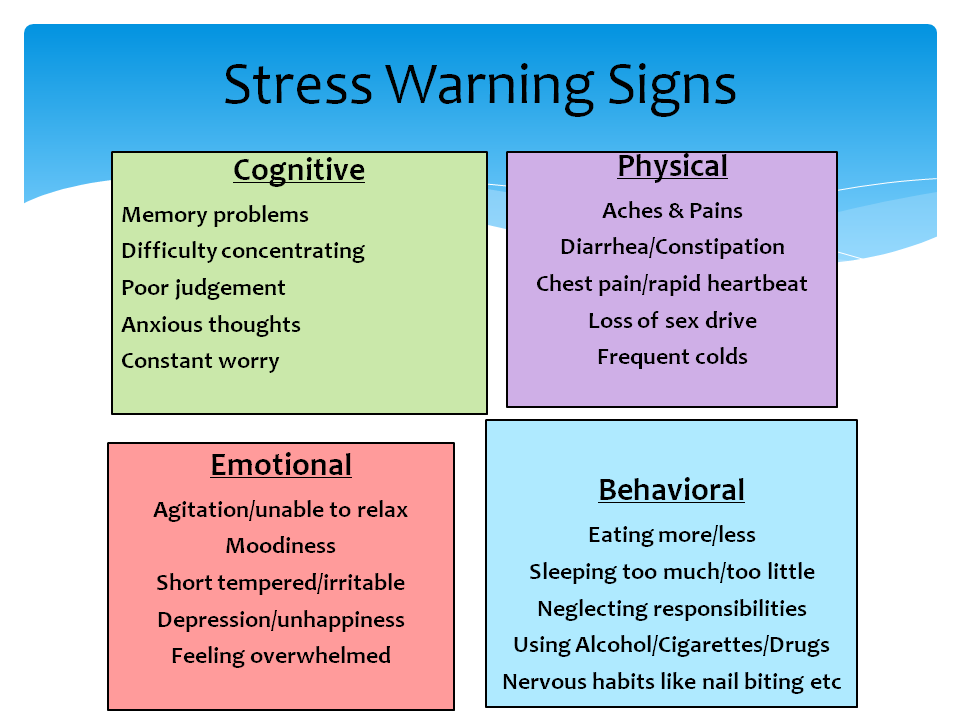
Stress accompanies us throughout our careers. The stages of their development are associated with physiological processes and are determined by hormonal emissions that the body reacts to the appearance of a stress factor. In general, such factors as a phenomenon are useful: for example, some people simply cannot pull themselves together without stress. But at the same time, it can also have a negative impact.
Stress now often comes with our information overload. The amount of information received has increased significantly, we cannot distance ourselves from it, manage the level of stress, and the body begins to react.
The body's response to stress
A person, reacting to stress from information overload, goes through three stages:
-
At first, he experiences a state of anxiety, realizing that something is happening, but this cannot be avoided.
 Begins to respond to e-mail faster, respond to signals from the network. This does nothing, calls continue to pour in, there is still an excess of information.
Begins to respond to e-mail faster, respond to signals from the network. This does nothing, calls continue to pour in, there is still an excess of information. -
After the stage of anxiety comes the stage of resistance, when it seems to a person that he has adapted and become "many-armed". He is trying with triple strength to process the data coming from outside.
-
The third stage is exhaustion, the person desocializes.
Information overload against the background of other stress factors (career, domestic) does not occur immediately. Many people are in the stage of resistance - they try to do everything, to be aware of everything, and for some this threatens to move to the stage of exhaustion.
Stress is caused by various factors: an unpleasant boss, a long road, endless multitasking, injustice in the team. But it is formed when these factors act many times, and we are unable to adequately resist or avoid them.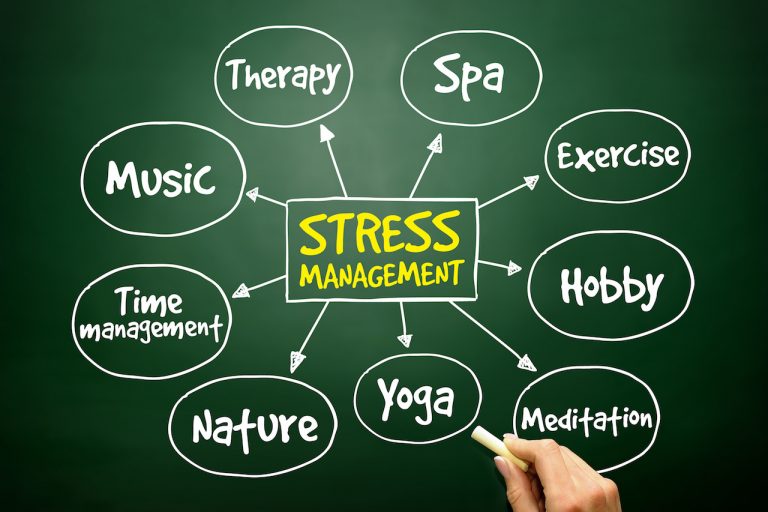
Acute and chronic stress
Stress can be both acute and chronic. They obey the same pattern, but acute stress gives a sharp surge and then a sharp exhaustion.
- Acute is a shock, a sharp event. Car accident, loss of a loved one, marriage (as a stress factor on the Holmes-Rage scale).
- Chronic causes a cumulative effect of stress hormones.
It is important to remember precisely about chronic stress, because in our mentality there is a habit of achieving victory through inhuman efforts on ourselves, to be people of the result. But many of the successful people are perfectionists, they are characterized by increased demands on themselves. If a person wants a lot from himself, then he can lose a lot, quickly burning out. The result of unmanaged stress is burnout.
Ways to deal with stress
The stressful state associated with an overabundance of information is special. You can deal with stress factors by devaluing them, without noticing, by changing the situation around you (for example, if stress is provoked by a manipulator, you can change your barriers, boundaries).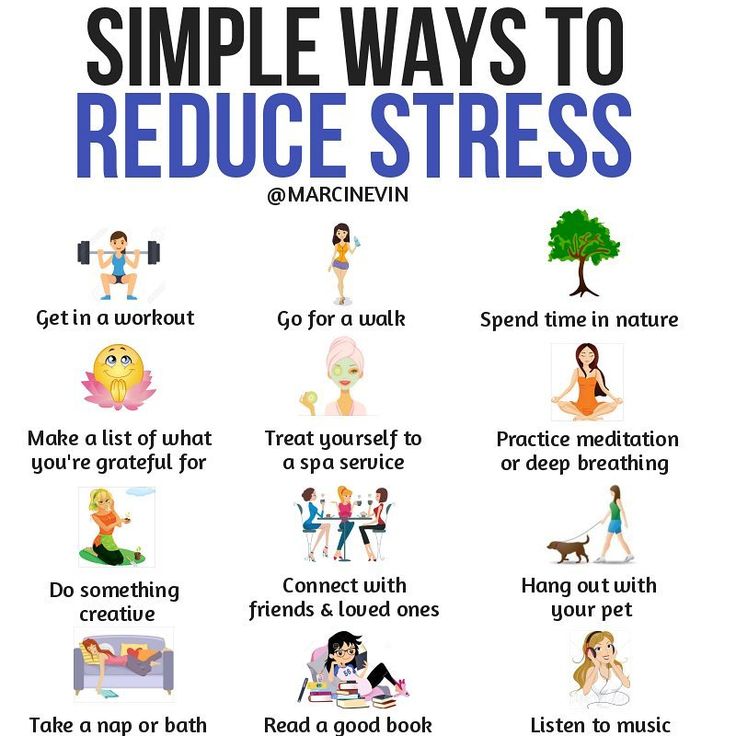
The main thing is to learn how to manage your condition, increase your own survival. To form a new holistic understanding of oneself, management tools. That is, in fact, constantly recover.
Facing stress
How can you prepare and withstand the load? You need to measure the level of stress that you have at the entrance, and compare it with the forces that you have initially, from nature. This is very clearly seen in children who are preparing to enter the institute, in our colleagues who are submitting an annual project.
We ourselves can prepare an important report with a presentation, final calculations for several days in a row with red eyes in order to present it to the authorities, get a budget, exhale and fall. This is a normal situation, and we can not leave the race at this moment. But the states of “afterburner and peak load limit” and “normal regular load” are very different.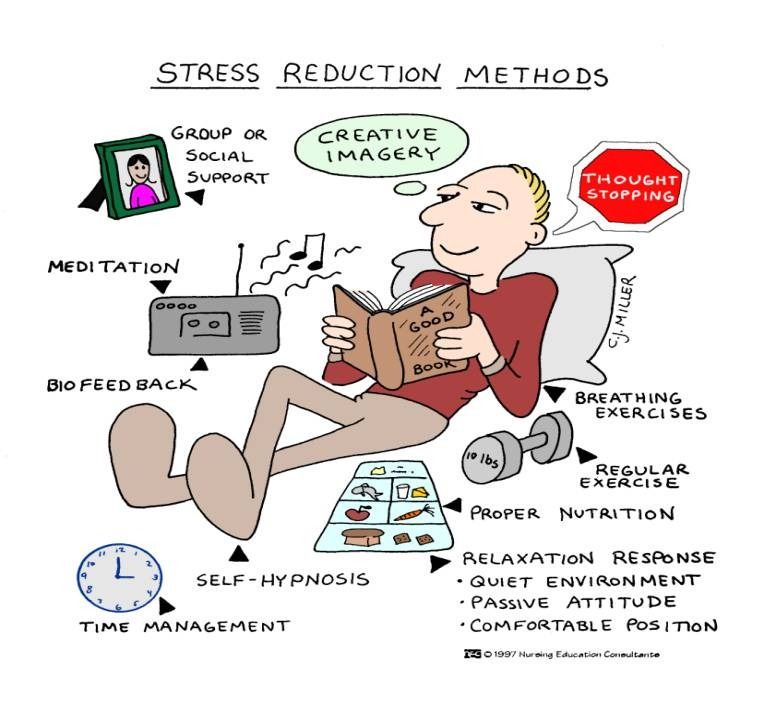
Therefore, it becomes important to measure the level of stress, for example, using the Holmes and Rage scale, which allows you to conditionally rank different events that occurred during the year. You can also do this even intuitively, but it is very important to see all the stressors in front of you.
For example: February, lack of sleep, traffic jams, protection of the project, the child is at home - and the nanny is late, wages are delayed, loans must be paid. This complex of factors gives the pre-peak load. Understanding that we are in the pre-peak load is an important point for stress management. Let's take a look at what you need to do while at the peak.
Stress Peak
At peak load, we understand that the resource is finite and needs to be replenished. Someone has more strength to recover, someone under stress behaves emotionally and this is enough for recovery. And someone gets sick, falls into a hypertensive crisis, while trying to keep an even mood.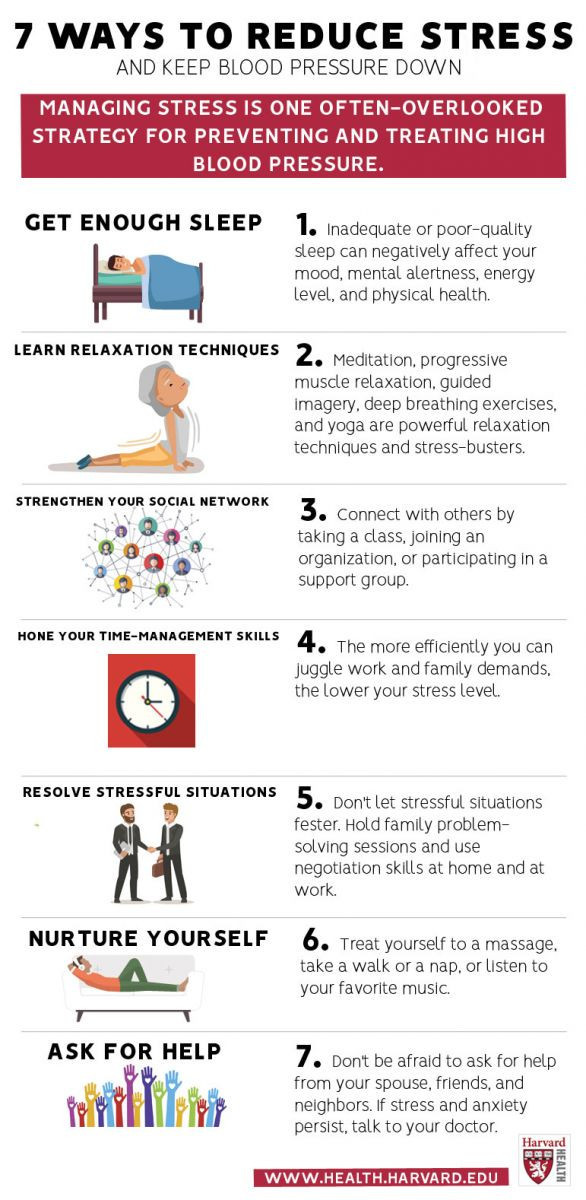
Being in a peak load, from which it is impossible to get out, we begin to treat ourselves as a seriously ill person, to take care of our physiological needs. In this race, we reject everything that requires additional energy costs - evening meetings with friends, serious conversations with loved ones, heavy additional physical activity, attempts by family members to organize moves, holidays, rearrangements. That is, everything that is not a priority, then there is a chance that the "seriously ill" will have enough strength to recover or just for a new day. Essentially, current consumption is limited.
How to recover
To restore the body, you need to pay attention to three main physiological factors, since stress is a hormonal reaction of the body:
-
Dream. The hormonal background is tied to the daily rhythm, you need to sleep 8 hours. This is a must for any stressful period.
-
Light physical activity.
 Under stress, the body produces a lot of the hormone cortisol, which increases the tone of blood vessels, increases the heart rate, and increases the amount of sugar in the blood. These factors, accumulating, destroy the body. Physical activity helps to get rid of cortisol in the metabolic process.
Under stress, the body produces a lot of the hormone cortisol, which increases the tone of blood vessels, increases the heart rate, and increases the amount of sugar in the blood. These factors, accumulating, destroy the body. Physical activity helps to get rid of cortisol in the metabolic process. -
Vitamin support (vitamins of group B, vitamin complexes).
It is believed that in a difficult period, additional emotions also delay part of the forces, so you need to minimize emotional manifestations.
If we have physically put ourselves in order, then at the next step we begin to feel uplifted. There is an emotional recovery, for which any pleasant experience is important: walks in beautiful places, online visits to galleries and exhibitions, meetings with friends. Social activity (getting a “like”, hearing “thank you”) also replenishes inner strength well. Many do yoga and meditate.
Another important factor in recovery from stress is the rejection of gadgets, information peace, which is considered one of the most effective means for preventing stress.